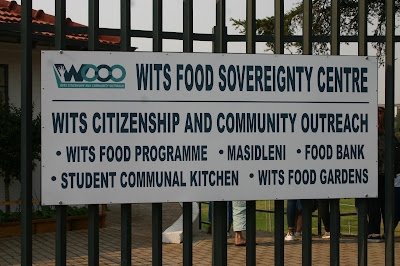If we could farm on our roof tops, Wouldn't It Be Cool (WIBC)?
 |
| The Hola Harvest Demo farm at the WIBC incubator at 1 Fox |
 |
| A-Frame Hydroponic system growing spinach |
 |
| A WIBC roof top garden. The restaurants at 1 Fox are among the main customers for the produce from the gardens |
Bringing this into the conversation on food security, the is limited scope to consider this initiative as an alternative which challenges the food system to be socially just. It might in a way fit into Alkon and Guthman’s argument, in the introduction of the New Food Activism book, on the inadequacy of alternatives in contributing to a ‘socially just food system’ because of how the produce from this initiative are mainly accessed by the relatively elite in the restaurants that it is sold to as well as those who are informed and appreciate the concept of the alternative, but they are still relatively more well off. It is a challenge to think of how this good quality produce, which is affordable, can be more accessible to the masses because the main problem is the volume that such farms produce which limit them to restaurants and farmers markets. We also learnt from our hosts that they have not yet partnered with the department of agriculture which is an obstacle in mainstreaming this type of agricultural work and bringing it to the underprivileged. This is confusing in our view because government should be getting in on such initiatives for the urban area where most people that are subject to hunger on a daily basis are located in the many urban food deserts.
We would like to acknowledge Ms. Halaliswe
Msimango, our host who showed us around the WIBC incubator and educated us on
all that takes place there as well as on the work that WIBC does in empowering young
previously disadvantaged innovators in various ways so that they can become
entrepreneurs. We appreciate that she shared with us how she came to work in
urban agriculture as well. We also appreciated learning that the hydroponic
systems we saw, the A-frame, table and vertical systems are products which have
been developed in South Africa with South African products, by South African people.
 |
| Spinach growing in A-frame hydroponic system |



Comments
Post a Comment